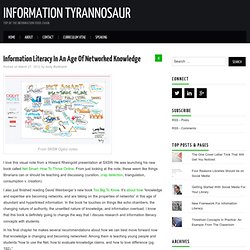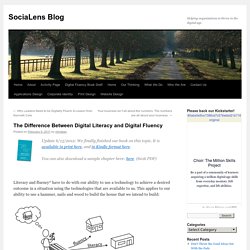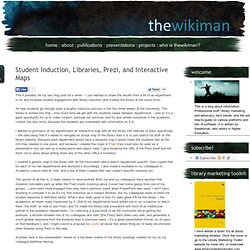

Tom D'Amico sur Twitter : "What is the role of memory in a digital age? - BBC News #ocsb #memory #digital #brain. What is the role of memory in a digital age? - ... Information literacy. Information Literacy Toolkit Tutorial. Information Literacy In An Age Of Networked Knowledge. From SXSW Ogilvy notes I love this visual note from a Howard Rheingold presentation at SXSW.

He was launching his new book called Net Smart: How To Thrive Online. From just looking at the note, these seem like things librarians can or should be teaching and discussing (curation, crap detection, triangulation, consumption v. creation). I also just finished reading David Weinberger’s new book Too Big To Know. It’s about how “knowledge and expertise are becoming networks, and are taking on the properties of networks” in this age of abundant and hyperlinked information. In his final chapter he makes several recommendations about how we can best move forward now that knowledge is changing and becoming networked. These types of literacies that Rheingold and Weinberger mention are important, but I don’t know if they get discussed many places. Are there lessons or ways that you address some of these skills in your information literacy instruction? Online Search Tools. Google PowerSearchingQuickReference. How To Search For Open Educational Resources.
5 MOOCs Teachers Should Take As Students 8.31K Views 0 Likes MOOCs may or may not save higher education, and if they save it they may further widen the gap between elite and lesser-known schools. They may also reinforce existing achievement gaps for students. As massive open online courses continue to evolve, however, educators need to know what they are and how they are changing the education landscape. The Difference Between Digital Literacy and Digital Fluency. Update 6/13/2012: We finally finished our book on this topic.

It is available in print here, and in Kindle format here. You can also download a sample chapter here: here (601k PDF) 60+ Fake and spoof websites. Plagiarism. You have something in common with the smartest people in the world.

You see, everyone has ideas. We use our minds to create something original, whether it’s a poem, a drawing, a song, or a scientific paper. Some of the most important ideas are published and make it into books, journals, newspapers and trustworthy websites that become the building blocks for things we all learn. But ideas are also very personal, and we need dependable ways to keep track of the people behind the ideas we use because they deserve credit for their contribution, just as you do if someone uses your idea. Passing off another person’s ideas or words as your own, without credit, is called plagiarism. Meet Cassie, a university student. She’s not the kind of person who would plagiarize by turning in someone else’s work, but she is aware that plagiarism can happen accidentally, so she follows some basic rules: Second, she’s careful to use only her own words when she’s not quoting directly. Information Literacy Tool.
Student Induction, Libraries, Prezi, and Interactive Maps. This’ll probably be my last blog post for a while – I just wanted to share the results from a bit of an experiment to try and increase student engagement with library induction (and market the library at the same time).

All new students go through quite a lengthy induction process in the first three weeks at the University. The library is slotted into that – how much time we get with the students varies between departments – and so it’s a good opportunity for us to make contact, promote our services, and try and embed ourselves in the academic culture, but also tricky because the students are overloaded with information as it is. I wanted to give each of my departments an interactive map with all the library info relevant to them specifically – the idea being that it’s easier to navigate an actual map of the library than it is to just search for stuff on the library website. The upshot of all this is, it really seems to have worked! Click to view larger original on Flickr - thewikiman.
Can the Digital Generation Do Anything Right? - Marketplace K-12. Learning and Teaching Digital Literacies. Evaluating Web-based material for your academic work by Karl Drinkwater on Prezi. Developing digital literacies. Overview Many learners enter further and higher education lacking the skills needed to apply digital technologies to education. As 90% of new jobs will require excellent digital skills, improving digital literacy is an essential component of developing employable graduates. Courses that embed core digital skills, as well as subject specific use of technology, enable students to gain the skills and confidence they need to use digital technology not only to support their learning but also in the workplace.
We’re working with colleges and universities to embed core digital skills into the curriculum. By digital literacy we mean those capabilities which fit an individual for living, learning and working in a digital society: for example, the skills to use digital tools to undertake academic research, writing and critical thinking; as part of personal development planning; and as a way of showcasing achievements.